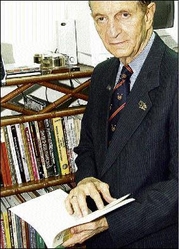IMF the only option, says Seaga - Deficit climbs to $52b
Published: Wednesday | September 2, 2009

Edward Seaga, former prime minister and Distinguished Fellow at the University of the West Indies. - Rudolph Brown/Chief Photographer
Former Prime Minister of Jamaica, Edward Seaga, says Jamaica has no alternative but the International Monetary Fund (IMF).
"I have been saying that before any decision was taken officially that we would return to the IMF," he said in response to questions posed to him at the American Chamber of Commerce of Jamaica economic breakfast forum at The Jamaica Pegasus Hotel last Thursday.
His pronouncement came just ahead of the posting of the Government's latest operational report indicating that the deficit has now climbed to $52.6 billion - $3 billion worse than projected at July 2009.
Tax collections are now $7.5 billion off base and total revenue $9.7 billion off target.
Total income for the combined four months to July was $86 billion, compared to bills and debt servicing costs of $139 billion.
"There is absolutely no choice. There is no commercial bank that you can go to find resources of up to several hundred million dollars to close the foreign exchange gap," Seaga said.
We have no choice
"And there is no resource institution you can go to find the necessary amounts to close the fiscal gap. IMF is the only bank that can provide those funds, so we have no choice," said the former leader of the Jamaica Labour Party (JLP).
Seaga, whose administration in the 1980s had a borrowing relationship with the IMF, said the primary objectives of an agreement would be to repair the fiscal deficit and the foreign exchange deficit.
He, however, made it clear that the JLP administration will have to exercise creativity to find new areas to replace the traditional foreign exchange earners of the country.
Seaga was referring to the bauxite industry, where all but one plant has been closed due to a slump in demand for the product, and the declining tourism industry.
"The foreign exchange deficit is the one that will give us a tremendous amount of trouble because most of the foreign exchange earning sectors are already almost up to the maximum in terms of their own earnings," he said, highlighting tourism and bauxite.
Now, he added, is the time for policymakers to get creative and seek out new areas of economic activity like "we did in the 1980s".
This, he said, was when his administration introduced the apparel manufacturing and modern-ised agriculture.
The Bruce Golding administration anticipates a decision by the IMF in October on a US$1.2 billion stand-by facility requested.
Priority areas
Already, the Bank of Jamaica has got US$303 million in Special Drawing rights that has boosted its foreign reserves to US$1.9 billion.
If the IMF is able to address the two priority areas and is able to lend other funds to help fund the semi-productive sector, Seaga said, the best way to use that fund is to put it into education.
"That is where I would like to see the funds go, because that is the real resource base of Jamaica that has not yet been fully utilised,"said the former prime minister now a fellow at the University of the West Indies.
Seaga however shied away from advising the government on the issue of cutting the public sector to contain a ballooning wage bill.
"Different folks have different strokes," he said in response to a question on how he would advise Golding on controlling the public sector wage bill.
The salary bill to July was $43 billion.
Seaga said he was forced to make the tough decision of cutting 27,000 jobs during 1987 when the country had a borrowing relationship with the IMF and had to satisfy its conditions.
However, Seaga whose presentation was titled "The IMF of the Past" said those days were different.
"The IMF of today is no longer looking at strategies that are extreme. The IMF of today has realised that varying the exchange rate is not a solution," he said.
"They have moved now to maintaining low inflation as the anchor of the variables they have to adjust but more than that, they have to realise that you can't adjust an economy by adjusting the figures, you have to adjust the people É and so now it is the IMF that is insisting on social programmes but in the past they never wanted any social programmes."
dionne.rose@gleanerjm.com





















